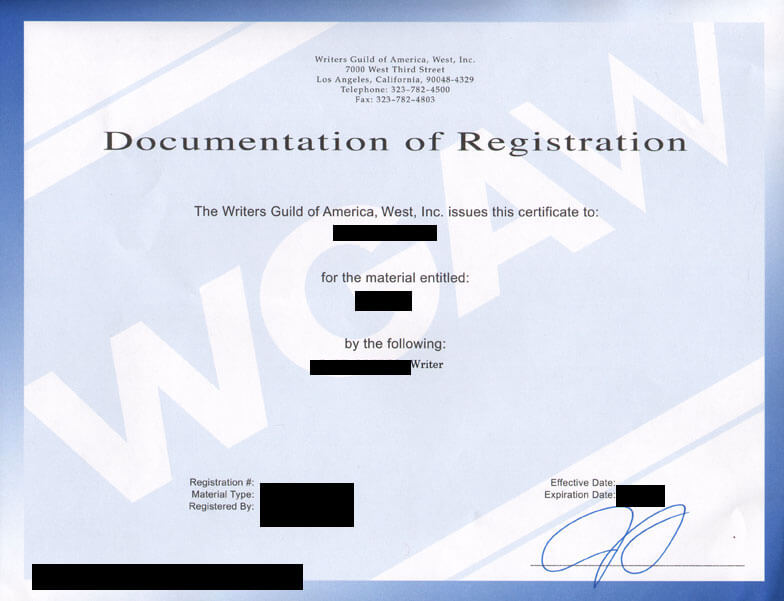When considering WGA registration for a screenplay, screenwriters need to keep several key things in mind. Those things are: what WGA registration entails, what it covers, how much it protects you, and exactly what it isn’t designed to do.
What is WGA Registration?
Put simply, the WGAw Registry is an entity that collects, logs, and archives written works submitted voluntarily from screenwriters and tv writers. It doesn’t matter whether those writers are members of the WGA or not. The idea behind WGA registration is to make it more difficult for plagiarists to pass off the script you’ve written as their own work and commercially and/or artistically exploit it.
How it works is that screenwriters file their scripts online with the WGA Registry, paying a fee (currently $20). The WGA Registry accepts the script and provides the screenwriter a registration certificate — a sort of receipt — that lists the specifics of the submitted script, as well as the time, date, and contact information of the writer who submitted it.
WGA Registration doesn’t make you a member of the Writers Guild
WGA registration is not a free ticket into the Writers Guild. Nor is registering your script with the WGA a requirement for you to join the Writers Guild. The WGA Registry exists as a service to raise the profile and awareness of the WGA while bringing in revenue for the WGA itself — revenue which is typically funded towards dozens of great pro-writer, pro-WGA services, community events, resources, and pro-writer groups such as the Writers Guild Foundation.
WGA Registration doesn’t guarantee your writing credit
The WGA Registry states very clearly that WGA registration doesn’t not generally help writers when determining writing credits when there’s a dispute of authorship, but it could help with regards to figuring out what drafts came from which writer, and in what sequence on the timeline, which could be helpful.
WGA Registration doesn’t last forever
The current duration is 5 years. After that, it’s not clear what they do with the material that writers have submitted for registration. It’s reasonable to assume that there is a process of culling expired material. This is because data storage costs can add up quickly.
That said, if you’re looking to add protection to your authorship of your work by registering it with the WGA, just remember that no registration lasts forever. That means you’ll need to renew it periodically. This is to make sure whatever protection you’re receiving is actually up-to-date and hasn’t expired.
WGA Registration does not take the place of copyright
To copyright your script or other written work is more important than registering your script, hands down. Registration and copyright both give you documentation that can be used in a court of law to prove authorship. That said, copyright is by far the stronger of the two. Visit https://www.copyright.gov/registration/ to copyright your screenplay and to find out more about the process and the protections it affords.
WGA Registration does help with questions of time and date
As we mentioned, when you submit your script to the WGA registry, or even here at Script Register, it’s timestamped. That time and date information can be invaluable. Especially in an arbitration by the WGA or independent arbitration or court case. Why? Because it proves, in black and white, that this exact written material (your screenplay) was written on, for example, January 2, 2030.
So if, pursuing this same specific example, let’s say a plagiarist producer decides to steal your script and slap his own name on it. Then he registers it with the WGA. And let’s say the day he does that is a date any time after January 2, 2030. If that’s the case, any reasonable judge or arbiter can conclude that your registration was the earlier one. Proving to any reasonable person that you are the originator of the work.
WGA Registration helps keep pro-writer funds flowing at the WGA
Every writer should support the WGA, in our opinion. Your WGA registration funds a lot of great writer outreach programs funded, as mentioned above. Is script registration in general something you should do? In another article, we dive into some of the pros and cons of script registration so you can decide for yourself if it’s right for you.
